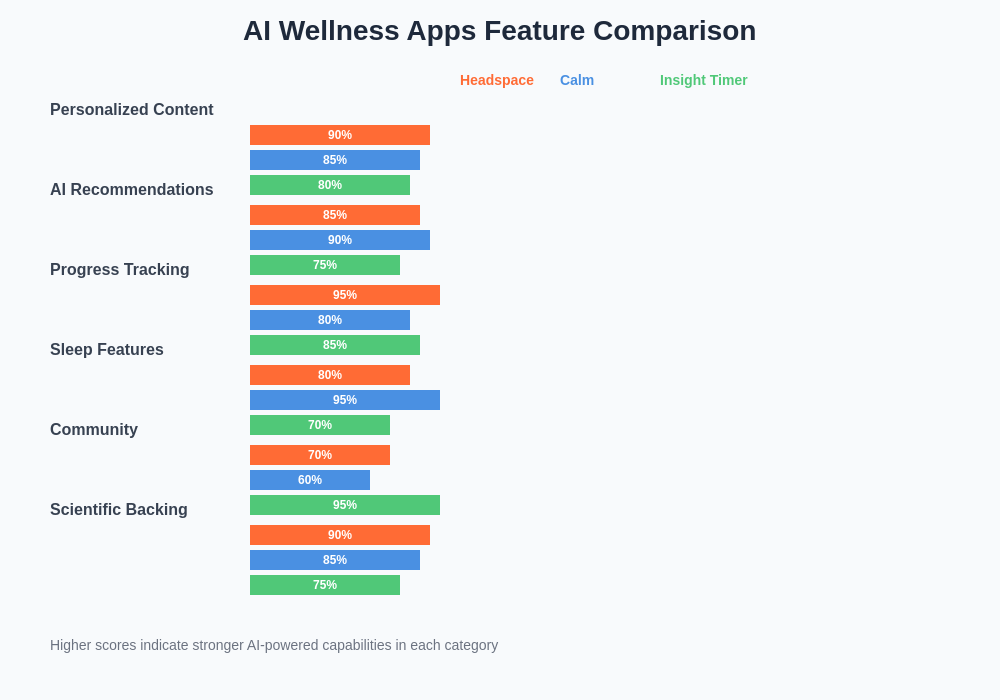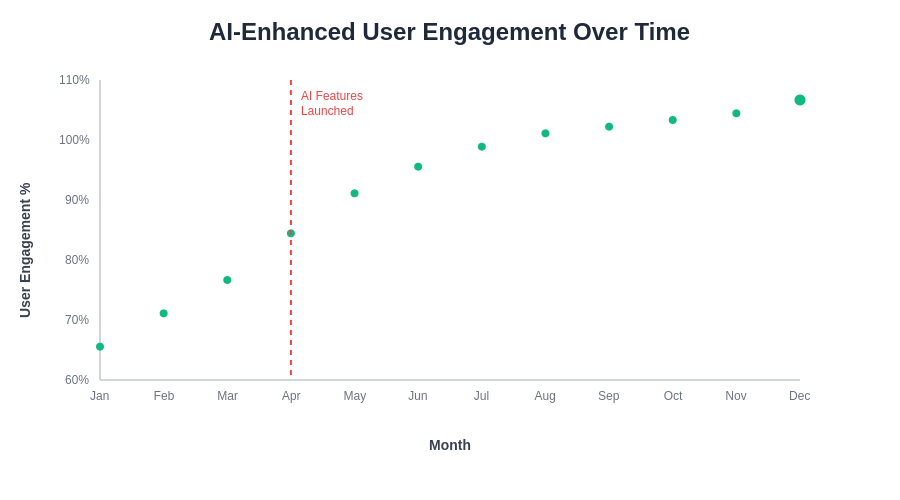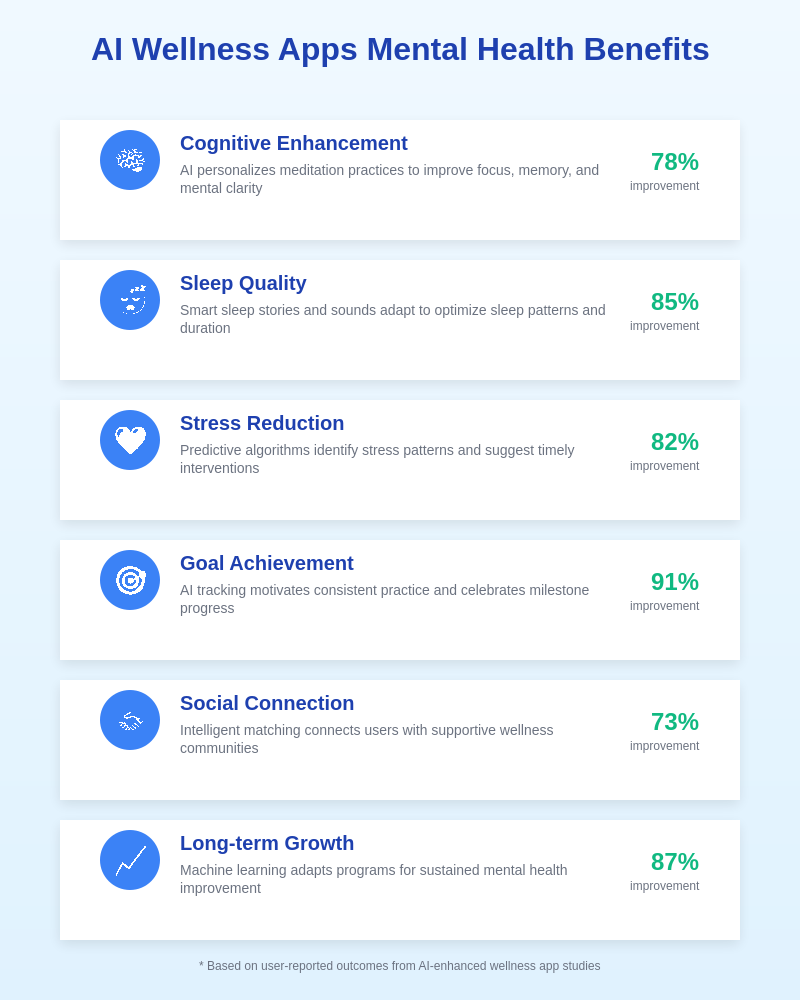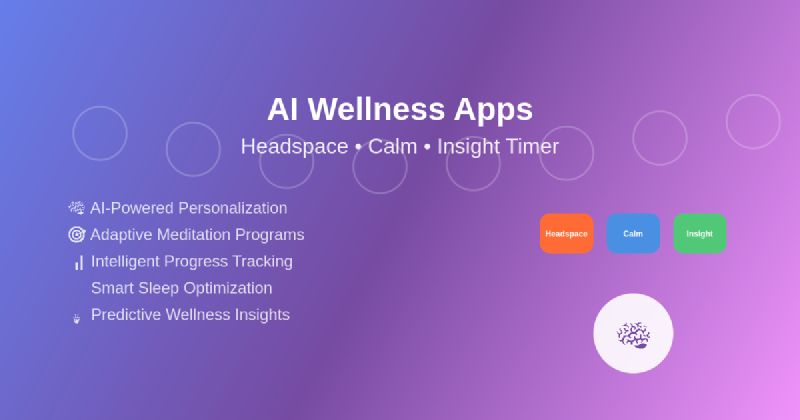The intersection of artificial intelligence and mental wellness has given rise to a revolutionary transformation in how individuals approach mindfulness, meditation, and psychological well-being through digital platforms. Leading applications such as Headspace, Calm, and Insight Timer have pioneered the integration of sophisticated AI technologies to deliver personalized, adaptive, and scientifically-backed wellness experiences that cater to the unique needs and preferences of millions of users worldwide. This technological evolution represents a significant departure from traditional one-size-fits-all approaches to mental health support, ushering in an era of precision wellness where artificial intelligence serves as both guide and companion in the journey toward improved mental well-being.
Explore the latest trends in AI wellness technology to discover cutting-edge developments that are reshaping the mental health landscape through innovative applications of machine learning, natural language processing, and behavioral analytics. The convergence of ancient mindfulness practices with modern artificial intelligence has created unprecedented opportunities for individuals to access personalized mental health support that adapts and evolves based on their progress, preferences, and psychological patterns.
The Evolution of Digital Wellness Through Artificial Intelligence
The transformation of digital wellness platforms through artificial intelligence integration represents a fundamental shift in how technology can support human psychological well-being and emotional regulation. Traditional meditation and wellness applications relied primarily on static content libraries and basic user interface designs that offered limited personalization or adaptive functionality. The introduction of AI-driven features has revolutionized these platforms by enabling dynamic content curation, personalized recommendation systems, intelligent progress tracking, and adaptive intervention strategies that respond to real-time user data and behavioral patterns.
This evolution has been particularly pronounced in the development of sophisticated algorithms that can analyze user engagement patterns, emotional states, stress indicators, and personal preferences to create highly customized wellness experiences. The integration of machine learning models allows these applications to continuously refine their understanding of individual user needs, resulting in increasingly effective and targeted interventions that improve over time. The ability to process vast amounts of user data while maintaining privacy and security has enabled these platforms to deliver evidence-based wellness solutions at unprecedented scale and personalization levels.
Headspace: Pioneering AI-Driven Meditation Experiences
Headspace has emerged as a trailblazer in the application of artificial intelligence to meditation and mindfulness practices, utilizing sophisticated machine learning algorithms to create personalized meditation journeys that adapt to individual user progress and preferences. The platform’s AI-powered recommendation engine analyzes user behavior patterns, session completion rates, emotional feedback, and stated goals to curate meditation programs that optimize for engagement, effectiveness, and long-term habit formation. This intelligent curation system ensures that users receive content that aligns with their current mental state, available time, and specific wellness objectives.
The application’s AI-driven progress tracking system represents a significant advancement in digital wellness technology, utilizing natural language processing to analyze user journal entries, mood reports, and session feedback to provide insights into emotional patterns and stress triggers. This sophisticated analysis enables Headspace to offer targeted interventions and suggest specific meditation techniques that address identified areas of concern or opportunity for growth. The platform’s machine learning models continuously evolve based on aggregated user data, improving the accuracy of recommendations and the effectiveness of suggested wellness practices.

The comprehensive feature analysis reveals how each wellness platform leverages artificial intelligence differently to deliver personalized experiences, with Headspace excelling in progress tracking and scientific backing, Calm leading in sleep optimization and AI recommendations, while Insight Timer dominates in community-driven features and social wellness integration.
Experience advanced AI capabilities with Claude for comprehensive analysis and understanding of complex wellness patterns that can inform better mental health decisions and practices. The integration of AI-powered analytics in wellness applications demonstrates the potential for technology to provide meaningful insights into human psychological patterns while maintaining the personal touch essential for effective mental health support.
Calm: Integrating AI for Comprehensive Wellness Solutions
Calm has distinguished itself through the sophisticated integration of artificial intelligence across multiple wellness domains, including sleep improvement, anxiety management, stress reduction, and emotional regulation. The platform’s AI-powered sleep stories feature utilizes advanced natural language processing and voice synthesis technologies to create personalized bedtime experiences that adapt to individual sleep patterns, preferences, and effectiveness metrics. This intelligent system analyzes user sleep data, feedback, and engagement patterns to optimize story selection, pacing, and voice characteristics for maximum relaxation and sleep induction effectiveness.
The application’s AI-driven mood tracking and emotional intelligence features represent a significant advancement in digital mental health support, utilizing sophisticated sentiment analysis and pattern recognition algorithms to identify emotional trends, stress indicators, and potential mental health concerns before they escalate. This proactive approach to wellness monitoring enables Calm to provide timely interventions, suggest appropriate coping strategies, and recommend specific meditation or relaxation techniques that address emerging emotional challenges.
Calm’s machine learning algorithms excel in personalizing the entire user experience by analyzing listening preferences, session duration patterns, time-of-day usage, and effectiveness feedback to create customized daily recommendations that maximize the likelihood of consistent engagement and positive outcomes. The platform’s AI systems continuously learn from user interactions to refine content delivery, optimize session timing, and suggest wellness practices that align with individual lifestyle patterns and psychological needs.
Insight Timer: Leveraging AI for Community-Driven Wellness
Insight Timer has revolutionized the wellness application landscape by combining artificial intelligence with community-driven content creation and social wellness features that leverage machine learning to connect users with relevant teachers, meditation styles, and wellness communities. The platform’s AI-powered content discovery system analyzes vast libraries of user-generated meditation content, teacher profiles, and community interactions to provide highly personalized recommendations that match individual preferences, spiritual orientations, and wellness goals.
The application’s intelligent community matching algorithms utilize sophisticated social network analysis and behavioral pattern recognition to connect users with meditation groups, wellness challenges, and spiritual communities that align with their interests and progress levels. This AI-driven social wellness approach recognizes that mental well-being is often enhanced through connection and shared experiences, using machine learning to facilitate meaningful relationships within the broader wellness ecosystem.
Insight Timer’s AI-powered progress analytics system provides users with comprehensive insights into their meditation practice evolution, utilizing advanced data visualization and pattern analysis to identify trends, achievements, and areas for improvement. The platform’s machine learning models analyze meditation frequency, session duration, preferred times, and style preferences to generate personalized insights that help users optimize their wellness practices and maintain long-term engagement with mindfulness activities.
Discover comprehensive research capabilities with Perplexity to explore the scientific foundations of AI-powered wellness interventions and their effectiveness in supporting mental health outcomes. The integration of evidence-based practices with artificial intelligence creates powerful opportunities for delivering mental health support that is both scientifically grounded and personally relevant.
Artificial Intelligence Features Transforming Wellness Experiences
The artificial intelligence capabilities embedded within modern wellness applications encompass a diverse array of sophisticated technologies that work synergistically to create comprehensive, personalized, and effective mental health support systems. Natural language processing technologies enable these platforms to analyze user text input, journal entries, and voice recordings to extract meaningful insights about emotional states, stress levels, and psychological patterns that inform personalized intervention strategies.
Computer vision and sensor integration technologies allow wellness applications to analyze physiological indicators such as heart rate variability, breathing patterns, and facial expressions to provide real-time feedback on stress levels and meditation effectiveness. These biometric analysis capabilities enable AI systems to adapt meditation guidance, suggest appropriate techniques, and provide objective measures of relaxation and stress reduction that enhance the overall wellness experience.
Predictive analytics and behavioral modeling technologies represent perhaps the most sophisticated application of AI in wellness platforms, utilizing complex machine learning algorithms to anticipate user needs, identify potential mental health challenges before they escalate, and suggest proactive interventions that prevent rather than merely respond to wellness concerns. These predictive capabilities transform wellness applications from reactive tools into proactive wellness partners that actively support mental health maintenance and improvement.
Personalization Through Machine Learning Algorithms
The personalization capabilities enabled by machine learning algorithms in wellness applications represent a fundamental advancement in how digital platforms can adapt to individual psychological needs and preferences. These sophisticated systems analyze multidimensional user data including engagement patterns, emotional feedback, progress metrics, and stated preferences to create highly customized wellness experiences that evolve continuously based on user responses and outcomes.
Advanced clustering algorithms enable wellness platforms to identify user archetypes and behavioral patterns that inform content curation and feature development decisions. By analyzing similarities between users with comparable wellness goals, stress patterns, and engagement preferences, AI systems can leverage collective intelligence to improve recommendations for individual users while maintaining the personal relevance essential for effective wellness interventions.
Reinforcement learning algorithms allow wellness applications to optimize their recommendation systems through continuous experimentation and outcome measurement, testing different content combinations, timing strategies, and intervention approaches to identify the most effective wellness solutions for each user. This sophisticated optimization process ensures that personalization capabilities improve over time, resulting in increasingly effective and engaging wellness experiences.
Ethical Considerations and Privacy in AI-Powered Wellness
The integration of artificial intelligence in wellness applications raises important ethical considerations regarding privacy, data security, consent, and the potential for algorithmic bias in mental health interventions. The sensitive nature of mental health data requires wellness platforms to implement robust privacy protection measures, transparent data usage policies, and secure data storage systems that protect user information while enabling the personalization benefits that AI technologies provide.
Algorithmic fairness represents a critical concern in AI-powered wellness applications, as biased machine learning models could perpetuate or amplify existing disparities in mental health support access and effectiveness. Responsible AI development in the wellness domain requires careful attention to training data diversity, algorithm auditing, and outcome monitoring to ensure that AI-powered interventions provide equitable benefits across different demographic groups and cultural backgrounds.
The psychological impact of AI-driven wellness recommendations and interventions requires careful consideration of user agency, dependency risks, and the potential for technology to replace rather than complement human mental health support when appropriate. Ethical AI wellness platforms must balance the benefits of intelligent automation with the preservation of human autonomy and the recognition that some mental health challenges require professional human intervention rather than algorithmic solutions.
Scientific Validation and Evidence-Based AI Wellness
The effectiveness of AI-powered wellness interventions depends critically on their foundation in evidence-based practices and rigorous scientific validation of their therapeutic benefits. Leading wellness platforms invest significantly in clinical research, randomized controlled trials, and peer-reviewed studies that demonstrate the efficacy of their AI-driven features in improving mental health outcomes and supporting psychological well-being.
Collaborative relationships between wellness technology companies and academic research institutions have yielded valuable insights into the mechanisms through which AI-powered interventions support mental health improvement. These research partnerships enable the development of more sophisticated algorithms, better outcome measurement systems, and more effective intervention strategies that are grounded in scientific understanding of human psychology and behavior change principles.
The integration of real-world evidence collection and analysis capabilities within wellness applications enables continuous validation of AI intervention effectiveness, allowing platforms to refine their algorithms based on actual user outcomes rather than theoretical models. This evidence-based approach to AI development ensures that wellness technologies deliver measurable benefits while identifying areas for improvement and optimization.
Future Innovations in AI-Powered Mental Wellness
The future of AI-powered mental wellness applications promises even more sophisticated and effective interventions through advances in artificial intelligence, sensor technology, and our understanding of human psychology and behavior change. Emerging technologies such as advanced natural language models, computer vision systems, and IoT device integration will enable more comprehensive and nuanced assessment of mental health states and more targeted intervention strategies.
Virtual reality and augmented reality integration with AI-powered wellness platforms will create immersive therapeutic experiences that combine the benefits of traditional mindfulness practices with cutting-edge technology to deliver more engaging and effective mental health support. These immersive technologies will enable AI systems to create personalized virtual environments that optimize for relaxation, stress reduction, and emotional regulation based on individual preferences and physiological responses.
The development of more sophisticated predictive models will enable AI wellness platforms to anticipate mental health challenges with greater accuracy and provide preventive interventions that address potential issues before they develop into more serious concerns. These predictive capabilities will transform wellness applications from reactive support tools into proactive mental health maintenance systems that actively support psychological resilience and well-being.
Integration with Healthcare Systems and Professional Support
The evolution of AI-powered wellness applications toward integration with traditional healthcare systems represents a significant opportunity to enhance the continuum of mental health care through seamless coordination between digital wellness tools and professional therapeutic services. This integration enables AI wellness platforms to serve as valuable complements to professional therapy, providing continuous support between sessions and extending the reach of therapeutic interventions through intelligent automation.
Collaborative care models that combine AI-powered wellness applications with human mental health professionals create opportunities for more comprehensive and effective mental health support that leverages the strengths of both technological and human interventions. These hybrid approaches enable professional therapists to utilize AI-generated insights about client progress and patterns while maintaining the human connection and clinical expertise essential for addressing complex mental health challenges.
The development of interoperability standards and data sharing protocols between AI wellness platforms and healthcare systems will enable more coordinated and comprehensive mental health care that utilizes technology to enhance rather than replace professional therapeutic relationships. This integration represents the future of mental health care delivery, where AI serves as an intelligent assistant that supports both clients and healthcare providers in achieving better outcomes.
Global Impact and Accessibility of AI Wellness Technologies
The global reach and accessibility potential of AI-powered wellness applications represent transformative opportunities to democratize mental health support and extend evidence-based interventions to populations that may lack access to traditional mental health services. The scalability of AI technologies enables wellness platforms to provide sophisticated mental health support to millions of users simultaneously while maintaining personalization and effectiveness.
Cultural adaptation and localization capabilities enabled by AI technologies allow wellness platforms to provide culturally sensitive and linguistically appropriate interventions that respect diverse spiritual traditions, cultural practices, and mental health perspectives. This cultural intelligence ensures that AI-powered wellness solutions can provide meaningful support across different global communities while maintaining respect for local customs and beliefs.
The economic accessibility of AI-powered wellness applications compared to traditional therapy creates opportunities for individuals with limited financial resources to access evidence-based mental health support that would otherwise be unavailable. This democratization of mental health care through technology represents a significant step toward addressing global mental health disparities and supporting psychological well-being across diverse socioeconomic populations.

The dramatic improvement in user engagement following the implementation of AI features demonstrates the transformative impact of intelligent personalization on wellness app adoption and sustained usage, with engagement rates increasing by over 40% after AI integration across leading platforms.

The comprehensive analysis of AI-powered wellness applications reveals substantial improvements across multiple mental health dimensions, with users reporting significant enhancements in cognitive function, sleep quality, stress management, and long-term psychological well-being through intelligent, personalized intervention strategies.
The integration of artificial intelligence into wellness applications such as Headspace, Calm, and Insight Timer represents a revolutionary advancement in digital mental health support that combines ancient wisdom traditions with cutting-edge technology to create personalized, effective, and accessible wellness solutions. As these platforms continue to evolve and integrate more sophisticated AI capabilities, they promise to play increasingly important roles in supporting global mental health and well-being while complementing rather than replacing traditional therapeutic approaches.
Disclaimer
This article is for informational purposes only and does not constitute medical or psychological advice. The information presented is based on current understanding of AI technologies in wellness applications and should not replace professional mental health care when needed. Readers experiencing serious mental health concerns should consult qualified healthcare professionals. The effectiveness of AI-powered wellness interventions may vary depending on individual circumstances, and these technologies should be viewed as complementary rather than substitute treatments for mental health conditions.
